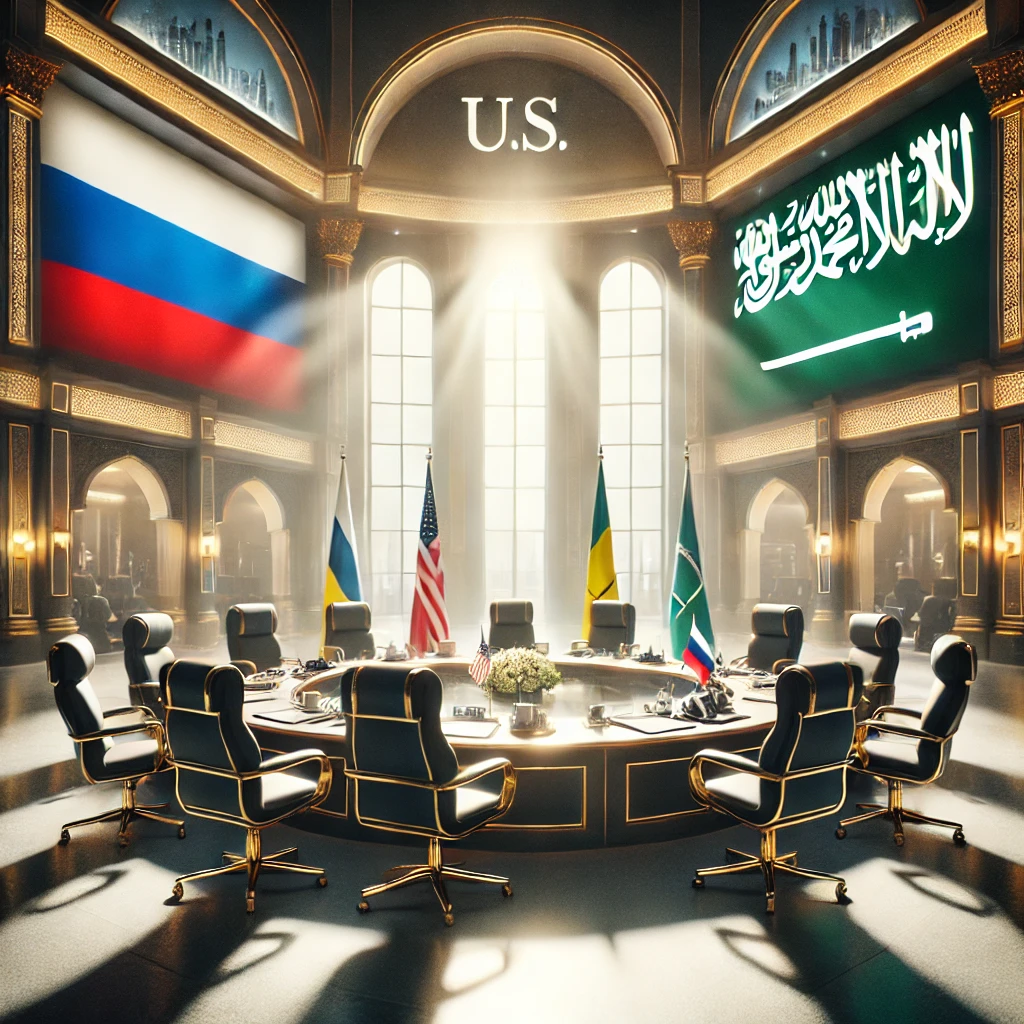Published: March 24, 2025 ✍️ By: Global World Citizen Diplomacy Desk 🌐 Source: GlobalWorldCitizen.com
In a development that could mark a significant shift in the Russia-Ukraine conflict, diplomatic delegations from both Moscow and Kyiv have engaged in U.S.-mediated discussions in Riyadh, Saudi Arabia. The talks, initiated separately with each side by American envoys, aim to establish a limited ceasefire—specifically focused on halting attacks on energy infrastructure and ensuring maritime safety in the Black Sea.
 What’s on the Table?
What’s on the Table?
The immediate priority is enforcing a temporary agreement reached last week by Russia and Ukraine to suspend strikes on each other’s energy facilities. Talks are centered on coordinating logistics, determining oversight mechanisms, and evaluating conditions for a 30-day full ceasefire as a gateway to broader peace negotiations.
Russian President Vladimir Putin and Ukrainian President Volodymyr Zelensky are both being briefed on the ongoing discussions, though neither leader is participating directly in this technical round of diplomacy.
 A Fragile Framework for Peace
A Fragile Framework for Peace
According to U.S. envoy Steven Witkoff, the long-term objective is securing a one-month truce—offering a crucial pause in hostilities and an opportunity to negotiate a more comprehensive peace plan. But deep-rooted disagreements remain over territorial control, military aid, and security guarantees.
Russia’s demands include:
A freeze on Ukraine’s military mobilization and training activities during the truce
A halt to foreign military support and intelligence sharing with Kyiv
Recognition of the Russian-occupied territories as legitimate Russian regions
Ukraine’s red lines are firm:
No recognition of Russian sovereignty over any part of Ukraine’s internationally recognized territory
No restrictions on its right to join NATO or scale down its armed forces
Security guarantees from Western allies as part of any settlement
 Delegations and Diplomats
Delegations and Diplomats
Russia: The Kremlin’s team is led by senior diplomat Grigory Karasin and Sergey Beseda, an intelligence official from the FSB. Karasin characterized the talks as “creative,” emphasizing the importance of maintaining open channels.
Ukraine: Defense Minister Rustem Umerov led Kyiv’s delegation, joined by military and diplomatic officials, including Pavlo Palisa and members of Zelensky’s peace negotiation task force.
United States: The mediation team includes special envoy Keith Kellogg, State Department policy director Michael Anton, and national security aides. Witkoff, a Trump-appointed envoy, is facilitating the dialogue and preparing for a potential Trump-Putin summit in the coming weeks.
 Key Issues: Energy & Black Sea Security
Key Issues: Energy & Black Sea Security
Alongside energy infrastructure protections, discussions include:
Reinstating the 2022 Black Sea grain deal, which Russia exited in 2023 over sanctions complaints
Establishing maritime security guarantees for international shipping through the Black Sea
Potential third-party monitoring of ceasefire terms, with the U.S. suggested as a neutral overseer
 Still a Long Road Ahead
Still a Long Road Ahead
While these talks represent a critical diplomatic opening, both sides remain deeply entrenched in their positions. Analysts caution that any agreement—limited or full—will require extraordinary political will and international coordination.
Ukrainian officials and veteran diplomats remain skeptical. Kostyantyn Yeliseev, a former deputy foreign minister, warned:
“We’ve seen ceasefires before, and most were quickly violated. Without enforceable, verifiable mechanisms, it’s difficult to trust the process.”
Meanwhile, Russia insists that a true resolution must address what it calls the “root causes” of the conflict—terms that Ukraine and its allies interpret as a demand for capitulation.
 What It Means for the World
What It Means for the World
As the U.S. re-engages in peacemaking, the outcome of these negotiations could have far-reaching implications—not only for the future of Ukraine but for global stability, food security, and the credibility of international diplomacy. The world is watching.

